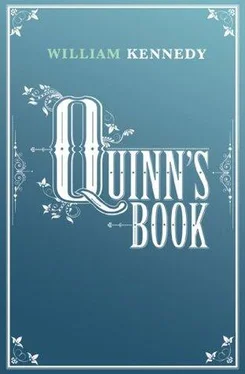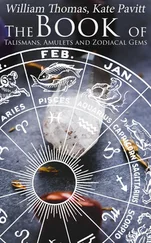As he approached his tethered horse he saw a coach and four coming up the carriageway from the new turnpike that now passed the Staats property, and Capricorn said, “That’s him now. Mr. Fitzgibbon.”
And so it was: Gordon Fitzgibbon, son of Lyman, a man Quinn knew by name but had not met. Beside him in the carriage Quinn saw a woman.
Then he saw it was a woman of love.
Saw Maud.
He could not have suspected or even intuited her presence here, and yet neither was this coincidence. We could call it Quinn’s will to alter existence, to negate life’s caprice and become causality itself. This was not the first time he had willed history to do his bidding, but it was the first time history had obeyed him. He’d come here seeking not Maud’s presence but the ethereal fragrance of her memory, all he could hope to find. Given that, he felt he would be able to trace her. Now here she arrives, and so begins a new confluence for these two strangers of love.
The coach halted at the mansion, and the coachman leaped to the ground, opened the door. Out first stepped Maud Fallon, dressed in black and white silks, her abundant auburn hair upswept into a crown encircled with a white ribbon, her skin exquisitely white; and upon seeing Quinn she said, “Daniel, I feared you were dead,” and gave him her hand, which he took and held.
“I seem to have survived,” he said, “but it may be an illusion.”
Maud turned then to Capricorn and said, “Cappy, will you bring in my boxes?” Then, nodding once at Quinn, she entered the mansion. Gordon Fitzgibbon approached Quinn with extended hand.
“You’re Quinn,” he said.
“That’s a fact,” said Quinn.
“I’ve heard about you and read your writing. You’re quite a famous fellow.”
“I think you exaggerate.”
“Not at all. Everybody knows Quinn.”
“I would have thought almost nobody knows him.”
“I’m a true admirer. You’ve projected me into battles and set me alongside those wounded soldiers. I could feel the weight of their haversacks. You have a talent for creating the vivid scene. Won’t you come into the house?”
“I was just leaving. I came to see Hillegond.”
“Poor Hillegond. But at least they caught the villain.” Gordon nodded sadly and, without waiting for Quinn’s response to his invitation, strode purposefully into the mansion.
Quinn debated whether to follow, stunned by Maud’s brusqueness, then decided he had not exhausted his fate’s capacity for surprise (and that’s why they call it your fate). Also he wanted to hear more about the villain, and so he left his horse and followed Gordon into what he now was forced to think of as the Fitzgibbon mansion. In the drawing room Gordon offered him whiskey, Quinn’s first under these multiple rooves. The two men then settled into facing armchairs, a table between them, and on it a bowl of grapes and apples. Gordon positioned himself so that he was framed from behind by his own enormous portrait: a figure of abundant black hair, strong of jaw and dark of eye, wearing a cloak flared over one shoulder, holding a sheared beaver hat in his right hand, and standing in boots and breeches on the steps of his newly acquired mansion: arrived — for the ages.
“A very good likeness, that,” said Quinn, perceiving the jaw in the portrait to be stronger than the jaw beneath it. Of Gordon’s past he remembered only Yale law school, but he would come to know the man as the successor to his father in running the family foundries, a serious churchgoer who abandoned his father’s Presbyterian life for the Episcopal high church, who translated Vergil’s Aeneid from the Latin and then dramatized the story of Aeneas and Dido for the stage; a man of many interests. One too many: Maud.
“It’s only been up a week,” said Gordon of his portrait, “but I am pleased with it. The artist worked on it five months. He began it even before I took title to this place.”
“You were very sure of yourself.”
“Once I heard Dirck was selling it, I had to have it. I bought it for Maud, really. She’s mad about being here.”
“It was quite a surprise to see Maud.”
“She’s spoken of you, but then again, who hasn’t? She’s here only a few days and then we’re going to Saratoga for the racing. She has a relative up there.”
“She looks well.”
“Indeed she does. She’s dazzling. We’ll be married soon.”
“Now, that’s a surprise, Maud married,” Quinn said, reaching for the grapes.
“She’s trepidatious about it.”
“Maud is always trepidatious about relationships,” said Quinn, popping grapes into his mouth.
“We’re solving it,” said Gordon.
“You’re a sturdy fellow,” said Quinn.
Quinn popped his final grape, then stood up and drank his whiskey in a gulp. “I must be going,” he said, “but first tell me about Hillegond.”
“The killer went upstairs and found her sleeping, looped the garrote around her neck and dragged her from the bed with it. It was clear she died in a moment and did not suffer.”
“Some suffer in a moment what takes others twenty years to feel.”
“I’m sure you’re right,” said Gordon, and his voice was receding for Quinn, only sporadic words registering: “. . strangled Matty. . the stairs. . she fought. .” For Quinn there was only Maud’s coldness, and he silently recited the old Irish poem of warning:
Wherefore should I go to death ,
for red lips, for gleaming teeth?. .
Thy pleasant mien, thy high mind ,
Thy slim hand, O foam-white maid ,
O blue eye, O bosom white ,
I shall not die for thy sake.
Repeat it now. Repeat.
For this is your fate.
“. . the fellow was shameless. . dressed like a priest. . Hillegond’s young lover, can you imagine?. . But he shows up in no records as a priest. . Did you know him?”
“Who?” asked Quinn.
“The priest fellow. Finnerty, if that’s his name. It’s what he went by in the theater. A bad apple, to say the least.”
“What about him?”
“Aren’t you listening, Mr. Quinn? He’s in jail. They’ve charged him as her killer. He had her jade ring. He said she gave it to him.”
“Hillegond?”
“Damn it, Quinn, are you all there? I took you to be acute. Are you ill, or what ails you?”
“I’m distracted, forgive me,” and he turned to leave, turned back. “Thank you for the whiskey.”
“I hoped to hear of your war experiences.”
“Another time.”
“Perhaps tonight if you’re not busy. Join us at the Army Relief Bazaar.”
“Perhaps,” said Quinn, straining.
“It’s for the sick and wounded, you know. I’m chairman of the thing. I’ve been so involved with the war that my father considers me a practical amalgamationist. I actually recruited an entire company of army volunteers out of our two foundries. A good many were Irish.”
“That’s very patriotic,” said Quinn.
“You must come to our bazaar,” said Gordon. “We’ll lionize you if you’ll let us.”
“I doubt I could handle that.”
“We’ll be going at seven. We could pick you up. Where are you staying?”
“I’m not sure.”
“You mean you don’t have a place? Why, stay here, then.”
“That’s generous, but I think—” and Quinn, in this instant, could not think at all.
From the doorway Capricorn intruded on the hesitational moment. “Mr. Quinn, Miss Maud say she got a letter she want you to read. She be upstairs in the sittin’ room.”
Quinn turned to Gordon, who was smiling.
“It’s pleasant in Maud’s sitting room,” Gordon said.
Quinn returned Gordon’s smile, feeling the sudden urge to stuff several grapes up the man’s nose. Then he followed Capricorn out of the room and up the stairs.
Читать дальше












